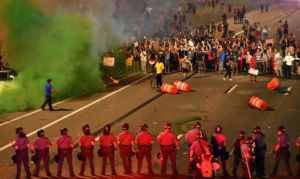Lawmakers Revive Bill Cracking Down on Freeway Protesters
One of leftist protesters’ go-to tactics involves shutting down freeways and blocking transit lines. The most notorious incident occurred in July 2016 when protesters took over I-94 following the death of Philando Castile.

Most recently activists targeted the light rail line on Super Bowl Sunday, albeit with limited success in the Star Tribune’s account.
At least 40 people strung themselves across the Metro Transit Green Line tracks near the University of Minnesota, blocking the tracks midafternoon for ticket holders using the line to get to the stadium.
A handful locked themselves to each other and to a railing at the station with a U-lock. Police forcibly removed 17 of them after about 90 minutes. No one was injured.
The 17 were cited for unlawful interference with transit, said Metro Transit spokesman Howie Padilla.
Lawmakers have revived a bill to increase the penalties for protesters that illegally blockade roads and transit lines.
Rep. Nick Zerwas (R-Elk River), who sponsors the provision as HF390, reiterated the bill is not about silencing voices, rather to deter illegal behavior.
“My goal is to get people not to block freeways, not to block access to airports, and not to shut down the billion-dollar train system,” he said. “… The First Amendment allows for people to protest. … It does not, however, afford you the right to park your Buick across three lanes of I-94. If you believe it does, you have been misinformed.”
But the protesters’ enablers at the Minnesota Legislature once again tried to put the brakes on the increased criminal penalties, according to Session Daily.
An amendment unsuccessfully offered by Rep. Jamie Becker-Finn(DFL-Roseville) would have removed a provision to increase the penalty from a misdemeanor to a gross misdemeanor for someone who intentionally obstructs traffic “entering, exiting, or on a freeway or entering, exiting, or on a public roadway within the boundaries of airport property with the intent to interfere with, obstruct, or otherwise disrupt traffic.” It would also add restricting passenger access to the statute regarding unlawful interference with transit.
Becker-Finn also led the charge to get protesters off the hook in similar legislation last session.
“My goal always in my role here is to do the just thing. I don’t believe that increasing penalties on those who feel compelled to publicly protest is the way to do that,” Becker-Finn said during the 30-minute discussion that largely echoed previous debates on the issue. “If we continue to see protests, that should tell us that we have work to do to address the underlying injustices that lead people to protest in the first place. If people feel heard and respected that will have a more meaningful impact on some of the things that we see in our communities than increasing penalties.”
Gov. Dayton vetoed a public safety bill last year that contained increased penalties for protesters that blockade freeways. But this year even Dayton has expressed concern over the public safety ramifications of protests that close off access to roads and airports. Yet this common sense legislation that enjoys broad public support may still come down to the wire in a shortened election year legislative session.